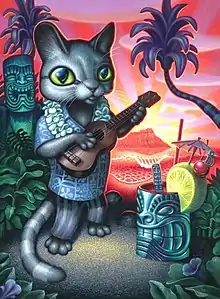Lowbrow (art movement)
Lowbrow, or lowbrow art, describes an underground visual art movement that arose in the Los Angeles, California area in the late 1960s.[1] It is a populist art movement with its cultural roots in underground comix, punk music, tiki culture, graffiti, and hot-rod cultures of the street.[2] It is also often known by the name pop surrealism.[3] Lowbrow art often has a sense of humor – sometimes the humor is gleeful, sometimes impish, and sometimes it is a sarcastic comment.[4]
 "Tiki Cat", lowbrow art by Brad Parker | |
| Years active | 1979–present |
|---|---|
| Country | United States |
| Major figures | Williams, Scharf, Ryden |
| Influences | Pop art, surrealism |
| Influenced | Designer toys |
Most lowbrow artworks are paintings, but there are also toys, digital art, and sculpture.
History
Some of the first artists to create what came to be known as lowbrow art were underground cartoonists like Robert Williams and Gary Panter. Early shows were in alternative galleries in New York and Los Angeles such as Psychedelic Solutions Gallery in Greenwich Village, New York City which was run by Jacaeber Kastor,[5] La Luz de Jesus run by Billy Shire[6] and 01 gallery in Hollywood, run by John Pochna.[5] The movement steadily grew from its beginning, with hundreds of artists adopting this style. As the number of artists grew, so did the number of galleries showing lowbrow. In 1992 Greg Escalante helped orchestrate the first formal gallery exhibition to take low brow art seriously; painter Anthony Ausgang's solo show "Looney Virtues” at the Julie Rico Gallery in Santa Monica. The Bess Cutler Gallery also went on to show important artists and helped expand the kind of art that was classified as lowbrow. The lowbrow magazine Juxtapoz, launched in 1994 by Robert Williams, Greg Escalante, and Eric Swenson, has been a mainstay of writing on lowbrow art and has helped shape and expand the movement.[7]
Origin of the term "lowbrow art"
In an article in the February 2006 issue of his magazine Juxtapoz, Robert Williams took credit for originating the term "lowbrow art." He stated that in 1979 Gilbert Shelton of the publisher Rip Off Press decided to produce a book featuring Willams' paintings. Williams said he decided to give the book the self-deprecating title The Lowbrow Art of Robt. Williams, since no authorized art institution would recognize his type of art. "Lowbrow" was thus used by Williams in opposition to "highbrow." He said the name then stuck, even though he feels it is inappropriate. Williams refers to the movement as "cartoon-tainted abstract surrealism."[8] Lately, Williams has begun referring to his own work as "Conceptual Realism."[9]
Books
There are several books which offer overview histories of lowbrow, including the following:
- Tropeano, Mauro (2020). Lowbrow Art / Pop Surrealism (Le Origini / La Storia). Blurb. ISBN 9781715775650.
- Shire, Billy (2011). La Luz de Jesus 25. Last Gasp. ISBN 9780867197648. A collection of La Luz de Jesus Gallery in Hollywood, CA that has carried Lowbrow art for 25 years.
- Williams, Robert; McCormick, Carlo; Reid, Larry (2004). Anderson, Kirsten (ed.). Pop Surrealism: The Rise of Underground Art. Last Gasp. ISBN 0867196181.
- Jordan, Matt Dukes (2005). Weirdo Deluxe: The Wild World of Pop Surrealism and Lowbrow Art. Chronicle Books. ISBN 9780811842419.
- Rose, Aaron; Strike, Christian; Baker, Alex (2004). Beautiful Losers: Contemporary Art and Street Culture. Iconoclast. ISBN 1891024744.
- Cullison, Sherri (2002). Vicious, Delicious, and Ambitious: 20th Century Women Artists. Schiffer Pub. Limited. ISBN 0764316346.
Magazines
- Juxtapoz
- PORK (magazine)
- Beautiful/Decay Magazine
- Tokion is a magazine with both Japanese and US editions.
- Hi-Fructose
See also
References
Citations
- Magliozzi (2009).
- Martinez (2015).
- Kordic (2016).
- Esaak (c. 2005).
- Douglas (2012).
- LaLuzDeJesus.com (n.d.).
- Givens (2013), p. 1.
- Williams (c. 2007).
- Williams (2010).
- Lindall (2006), p. 168.
Sources
- Douglas, Beth (March 28, 2012). "An Introduction to Lowbrow Art and Pop Surrealism". Redbubble.com. Melbourne, Australia. Archived from the original on December 16, 2018. Retrieved December 16, 2018.CS1 maint: ref=harv (link)
- Esaak, Shelley (c. 2005). "The Lowbrow Movement: Art History 101 Basics". ThoughtCo.com. New York, NY. Archived from the original on April 14, 2018. Retrieved December 15, 2018.CS1 maint: ref=harv (link)
- Givens, Joseph R. (May 2013). Lowbrow art : the unlikely defender of art history's tradition (MA). Louisiana State University and Agricultural and Mechanical College. etd-04132013-151026. Archived from the original on December 16, 2018. Retrieved December 16, 2018.CS1 maint: ref=harv (link)
- Kordic, Angie (July 4, 2016). "What is the Lowbrow Art Movement? When Surrealism Took Over Pop". Widewalls.ch. London, England. Archived from the original on July 9, 2016. Retrieved December 16, 2018.CS1 maint: ref=harv (link)
- "La Luz De Jesus: About". LaLuzDeJesus.com. Los Angeles, CA. n.d. Archived from the original on November 30, 2018. Retrieved December 15, 2018.
- Lindall, Terrance (March 2006). "What's New In the Surreal World - Surrealism isn't Dead, It's Dreaming". Art & Antiques. Wilmington, NC: Art & Antiques Worldwide Media, LLC. Retrieved December 16, 2018.CS1 maint: ref=harv (link)
- Martinez, Ricardo (December 5, 2015). "From Pop Surrealism to Lowbrow - Something Got Lost in Translation". Widewalls.ch. London, England. Archived from the original on December 11, 2015. Retrieved December 16, 2018.CS1 maint: ref=harv (link)
- Magliozzi, Ron. "Tim Burton: Exercising the Imagination." Tim Burton. The Museum of Modern Art, 2009, pp. 9-15.
- Williams, Roberts (February 7, 2010). "Molly Barnes Art News" (Interview). Interviewed by Molly Barnes. Los Angeles, CA: KCSN.CS1 maint: ref=harv (link)
- Williams, Robert (c. 2007). "Robert Williams Essay - beinArt Surreal Art Collective". beinArt.org. Archived from the original on May 9, 2008.CS1 maint: ref=harv (link)